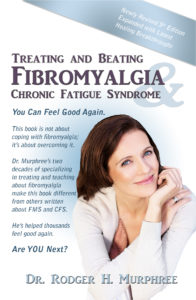What Determines a Diagnosis of Chronic Fatigue Syndrome?
 I talk a lot about fibromyalgia on my blog, and that is because it is much more common than the other disease I treat, chronic fatigue syndrome/myalgic encephalomyelitis (CFS/ME). Patients with fibromyalgia generally battle a lot more fatigue than those with other autoimmune, arthritic, or rheumatic diseases. There are a lot of symptoms that go with fibromyalgia, so if you do not meet those requirements but still have excessive fatigue, then CFS/ME or a sleep disorder may be the cause.
I talk a lot about fibromyalgia on my blog, and that is because it is much more common than the other disease I treat, chronic fatigue syndrome/myalgic encephalomyelitis (CFS/ME). Patients with fibromyalgia generally battle a lot more fatigue than those with other autoimmune, arthritic, or rheumatic diseases. There are a lot of symptoms that go with fibromyalgia, so if you do not meet those requirements but still have excessive fatigue, then CFS/ME or a sleep disorder may be the cause.
The Centers for Disease Control and Prevention (CDC) published guidelines in 1994 that help clinicians diagnose CFS/ME. These guidelines are published in the Annals of Internal Medicine, which gives a summary of both the inclusion and exclusion criteria for the diagnosis. A brief description can be found at this site: http://www.cdc.gov/cfs/case-definition/1994.html but I will also discuss some of this information below.
It was not until early 2007 that the name of the condition was changed from just chronic fatigue syndrome to chronic fatigue syndrome/myalgic encephalopathy. Myalgic encephalopathy means that the fatigue, pain, and various other symptoms that are in the muscles happen because of an unidentified malfunction in the central nervous system. This was substantiated because the imaging studies of the brain in those with CFS and fibromyalgia showed changes in blood flow to the brain and abnormal functioning, so it was not just generalized fatigue and pain. It is felt that this name better reflects the extent of the disorder.
There are two main criteria for a CFS/ME diagnosis:
- Fatigue: This is referring to severe fatigue that cannot be explained by lack of sleep or extreme stress. It is generally not relieved by rest and can cause problems with daily functioning. It also has an identifiable onset such as right after being sick with an infection or contracting Lyme disease. To be eligible to meet this portion of the criteria, the excessive fatigue must be persistent and last for at least six consecutive months.
- You must also have four or more of the following symptoms:
 Problems with concentration or memory loss.
Problems with concentration or memory loss.- Tender lymph nodes in the neck region. They do not have to actually be swollen, just tender and uncomfortable. This can also happen in people with fibromyalgia.
- Sore throat with or without symptoms of an infection.
- Pain in the muscles.
- Joint pain (not arthritic in nature).
- Recent onset of headaches, usually migraine or tension-type.
- Not feeling refreshed or rested after sleep, especially upon waking in the morning but also feeling tired all throughout the day.
- Malaise after exertion, which presents as pain, fatigue and flu-like symptoms after even mild exercise.
Many of the above criteria are often present in patients with fibromyalgia too, especially those that have to do with pain. Both CFS/ME and fibromyalgia diagnoses should be followed up with tests that look for other possible causes of the fatigue and pain like low thyroid function, arthritis, low iron level, etc. If any of these conditions are found alongside symptoms of CFS/ME or fibromyalgia and correcting those conditions do not relieve symptoms, then special care and attention should be dedicated to finding a more appropriate treatment regimen that includes out-of-the-box thinking, investigating, and strategizing.
The CDC diagnosis criteria for ME/CFS unfortunately excludes a number of people who have underlying medical problems like lupus or hypothyroidism, but includes people with tender points and depression or anxiety. These kinds of exclusions can lead to missed diagnosis and therefore inadequate treatment.
There is a great deal of research on the causes of chronic fatigue syndrome/myalgic encephalopathy, so if you fit the above general criteria, then it is time to discuss treatment options with your primary doctor. Sadly, many conventional doctors will not recognize this as a treatable disease, so if you find yourself in the office of what I consider a “stupid doctor,” who does not listen to you, then get out of there immediately and seek another consult.
Look for a physician who will not go solely by criteria outlined by the CDC. Those guidelines tend to over-generalize and create too much of a black-and-white scenario in diagnosis. Every patient will be different, so it will be important to go with a doctor who will listen to your concerns and work as a partner in health to find the right treatment regimen to restore your body’s hormonal, chemical, and nutritional imbalance.
CFS/ME is harder to diagnose than fibromyalgia because of these exclusions, which would explain why 2% of the population have fibro while only 0.5% have a CFS/ME diagnosis, even though symptoms are similar. As physicians, we must look past the generalized criteria and focus on individual patient needs.
 You can learn more CFS/ME and how it differs from fibromyalgia in my book, Treating and Beating Fibromyalgia and Chronic Fatigue Syndrome.
You can learn more CFS/ME and how it differs from fibromyalgia in my book, Treating and Beating Fibromyalgia and Chronic Fatigue Syndrome.











I was finally diagnosed with CFS/ME a few weeks before the IOM report came out suggesting that the name be changed to Systemic Exertion Intolerance Disease SEID with new proposed criteria. I know it sounds like there is a lot of controversy about the name change and the report, but it does seem like the new proposed diagnostic criteria would make it easier for doctors to catch the diagnosis and I liked how it addressed some of the comorbid conditions. I think I may have had it over 20 years undiagnosed.
Dr Murphee I just need help. I have Fibro and I being dealing with symptoms by eating a clean style diet. I lost over 20 pounds. But my pain in my legs, chest ect is bad. What type of test you will run to check my health. I need to know how my sugar, blood, cholesterol is. How my adrenal glands are? Do I have vitamin deficiencies? So far only D. I can’t take the D because I bleed from my rectum. I am tired and the pain is keeping me from enjoying life. Thanks!
Maria I’d love to help. Please call the clinic. You can learn more about phone consults at //fibroconsults.com/
I’d love to help. Please call the clinic. You can learn more about phone consults at //fibroconsults.com/
Please contact me with an office number where I can call you live and in person.
Thank you,
Chèrie Martin
Smile and change the world. ☺
Please call the clinic 205-879-2383